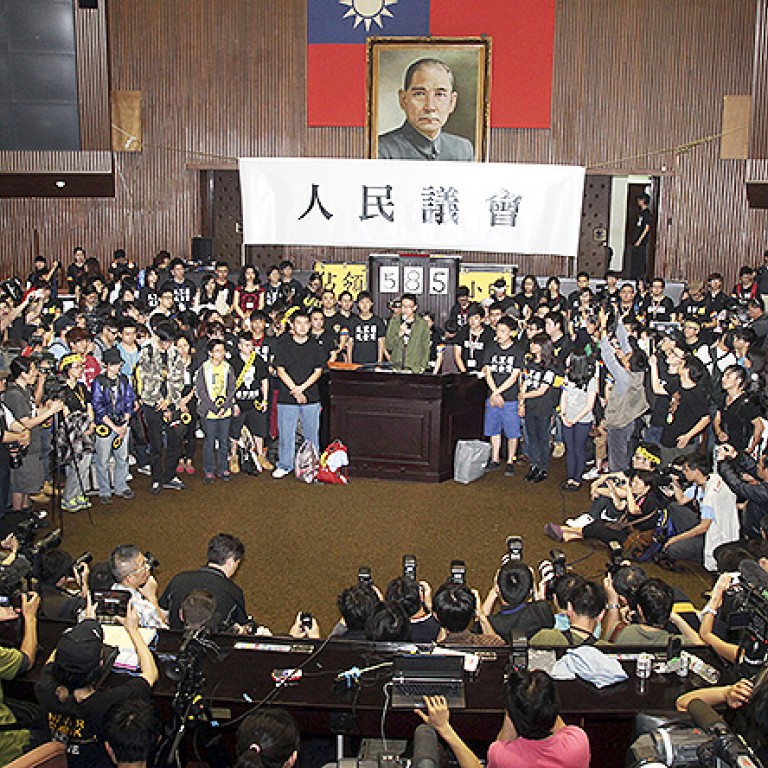
Update | Taiwan activists peacefully exit parliament after weeks-long occupation
Zhang Zhijun, the mainland's leading official on Taiwan affairs, says legislature occupation stressed need to listen to island's grass roots
The student occupation of Taiwan's legislature chamber against a services trade pact with the mainland ended peacefully yesterday.
But the 24-day protest has apparently prompted some soul-searching among senior Beijing officials regarding cross-strait relations.
Watch: Taiwan demonstrators end parliament seizure
A meeting between Premier Li Keqiang and Taiwan's former vice-president, Vincent Siew Wan-chang, at the Boao Forum yesterday did not directly touch on the protest.
But Li's top official on Taiwanese affairs, Zhang Zhijun, said the movement reminded him of the importance of listening to grass-roots voices.

The occupation of Taiwan's Legislative Yuan by more than 200 students, dubbed the "sunflower" movement by local media, was declared over by their leader, Lin Fei-fan, at 6pm.
Student leaving the parliament building each held a sunflower, which they passed to volunteers and their supporters waiting outside. More than 1,600 police officers were deployed to monitor the withdrawal, which passed without incident.
I need to understand the thinking of [Taiwan's] grass roots
Despite the peaceful ending, students vowed to continue pressing their campaign to stop the government from ratifying the trade pact with Beijing. They argue the pact will cost local jobs and infringe upon Taiwan's sovereignty.
The sit-in came to an end after legislative speaker Wang Jin-pyng pledged on Sunday not to preside over further debates on the trade pact until a law had been introduced to monitor new agreements with Beijing - a key demand of the protesters.
Taiwanese President Ma Ying-jeou endorsed Wang's pledge, even though many Kuomintang lawmakers claimed Wang's stance violated the party's political rules.
Li told Siew Beijing was willing to share its development opportunities with Taiwan first, and extend its opening-up to the island, Xinhua reported. He called on Taiwanese to seize the opportunity to expand economic co-operation with the mainland.
Siew, who is leading a Taiwanese team at the forum, said the pact was not raised in his talks with Li.
Instead, they focused only on cross-strait macroeconomic and co-operation issues.
Speaking in Boao, Zhang, who heads the mainland's Taiwan Affairs Office, said the protest against the pact reminded him of the importance of listening to all voices on the island. "The [students'] movement gave me inspiration. I need to understand all cases in Taiwan, especially the thinking of the grass roots," Zhang said on the sidelines of the forum's opening.
He said he hoped to make his first visit to Taipei by June, when he could communicate directly with the Taiwanese public to better understand their concerns.
Zhang said he had noted concerns that only giant corporations in Taiwan had benefited from the Economic Co-operation Framework Agreement, which Beijing and Taipei signed in 2010.
Li Fei , deputy director of Xiamen University's Taiwan Research Institute, said the student movement would lead both Beijing and Taipei to adjust their long-term cross-strait polices.
"It's a fact that the framework agreement only benefits commercial giants with strong connections to the KMT, and Beijing should come up with some policies that take into consideration the interests of the island's grass roots," he said.
Wang Hsing-ching, a Taipei-based commentator who supports the main opposition Democratic Progressive Party and writes under the name Nan Fang-shuo, said Ma had learned a valuable lesson from the protests and on the art of reaching a compromise, thanks to Wang.

